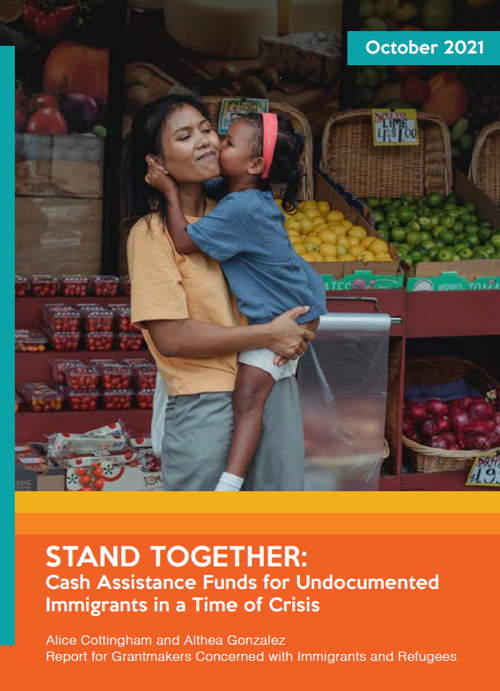
Executive Summary
This is a report about a time of desperation, illness, economic crisis, and death for immigrants. It is a report about remarkable collective action to respond with vital cash assistance. It is a reflection on raw truth, and on what has been learned so far in a pandemic that has not yet ended. It is a philanthropic call to action: a call to embrace the best of pandemic funding and forward-thinking, long overdue equity-centered grantmaking, to step up in a larger way to press for systemic change, to stand together.
In March 2020, Covid-19 began to smolder in the U.S. Among the hardest hit have been Black Americans, Latinx people, essential workers, older people, people with comorbidities, and individuals living in poverty. Immigrants, often members of one or more at-risk groups, have been disproportionately affected. Undocumented people are particularly vulnerable as a consequence of often unsafe occupations, crowded living conditions, and lack of access to health care. The pandemic’s devastating impact on hours and jobs in many low-wage industries caused widespread economic insecurity and financial ruin for undocumented people as well.
Uprisings in 2020 for racial justice following the murder of George Floyd coincided with rising deaths from Covid-19. Recent calculations found that Covid-19 has slashed the average lifespan of Black and Latinx people in the U.S. by two years. Structural racism compounded by the pandemic proved deadly.
In response, foundations, state and local governments, and community nonprofits worked together. Hundreds of funds provided crisis relief to undocumented immigrants, getting cash to people excluded from federal aid and ineligible for most safety net benefits.
Commissioned by Open Society Foundations and Grantmakers Concerned with Immigrants and Refugees (GCIR), Stand Together analyzes findings from nationwide research, about such assistance to undocumented immigrants and their families during this time. Using an online survey, one-on-one interviews, and literature review, we identified reliable, successful ways to respond, often centered on racial justice and efforts to reach the most marginalized. We describe these, along with a few variations that were equally effective, and also identify quandaries that funders should consider in future crisis responses.
A central theme of the outpouring of pandemic support is familiar from other times of crisis: remarkable efforts helped some, and illustrated just how urgently structural solutions are needed to reach everyone. Relief can never fix inequalities.
But systemic change can. In responding with cash assistance, some foundations came to realize that relief was not enough, and turned to systems change funding. Others reaffirmed their previous commitments to structural change, even as they added direct relief in the early days of the pandemic.
The report ends with recommendations in three categories:
- Philanthropic role and practice
- Partnering with immigrant justice organizations
- Beyond cash assistance to systemic change
The first of these addresses the importance of philanthropy’s rapid response to the needs of undocumented immigrants during crises, and incorporating powerful crisis practices into their usual grantmaking strategies. The second urges funders to lift up funding to organizations that have relationships with the most marginalized, and to continue to direct resources to immigrant infrastructure. The final recommendation encourages grantmakers to aim for the largest goals: fully inclusive federal, state, and local crisis response and other forms of deep structural change that eliminate inequities.
Open Society Foundations and Grantmakers Concerned with Immigrants and Refugees commissioned this report as part of a larger effort to make resources, knowledge, and infrastructure developed during the pandemic known to grantmakers responding to future economic disruptions.
Stand Together describes Covid-19 direct relief funds for undocumented immigrants and records promising practices for crisis grantmaking in immigrant communities. The report addresses issues of particular interest to philanthropy: optimal ways to support and operate these funds, and other ways foundations might use their power beyond cash assistance. The report draws on information gathered from 30 guides and reports, survey responses from more than 100 funds (76 community-based groups and nonprofits, 25 philanthropies, and 12 state and local governments) that provided specifics about their efforts, along with 22 in-depth interviews.
Read the full report below.
| Attachment | Size |
|---|---|
| 1.78 MB |